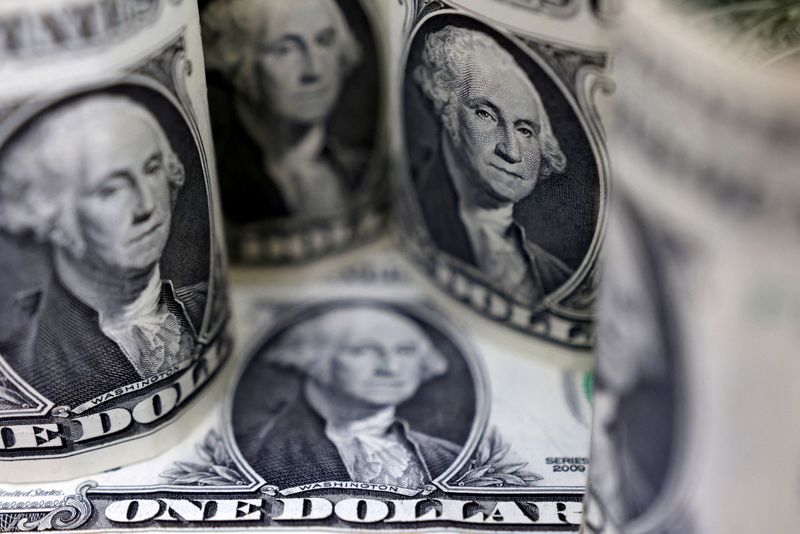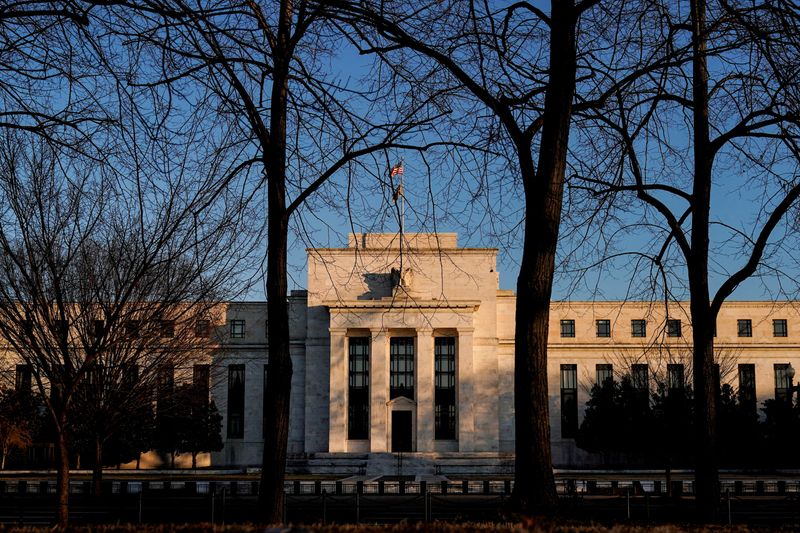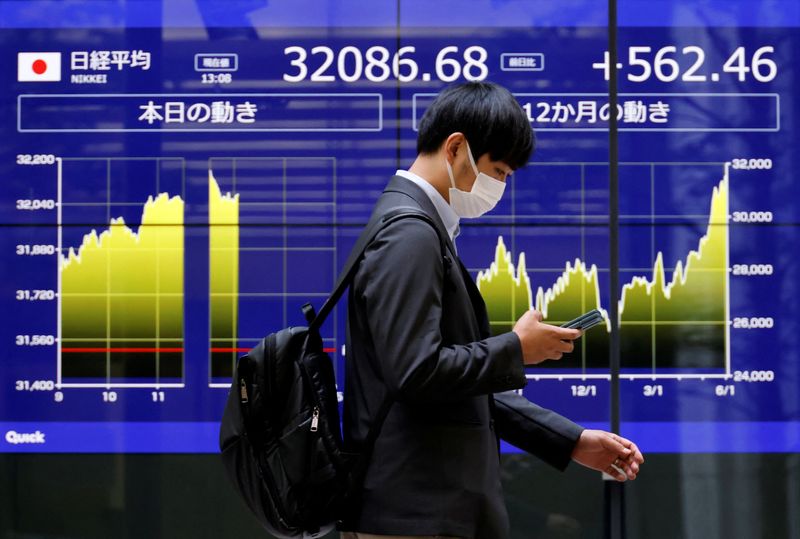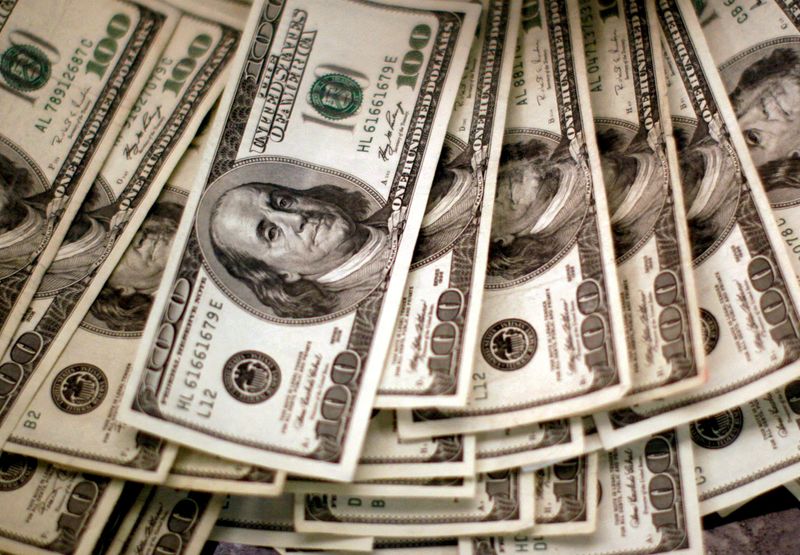Select Language

SEOUL (Reuters) - South Korea's parliament on Thursday approved increasing next year's budget by a net 17.9 trillion won to 656.6 trillion won ($503.50 billion).
The increase is the smallest in two decades as authorities prioritise fiscal discipline in a U-turn from expansionary expenditure made during the coronavirus pandemic, according to the nation's finance ministry.
By restraining spending, President Yoon Suk Yeol's administration plans to bring the ratio of fiscal deficit to GDP back below 3% from 2025.
The 656.6 trillion won of fiscal expenditure penciled in for next year will widen the deficit-to-GDP to 3.9% from an estimated 2.6% this year.
($1 = 1,304.0700 won)

By Rae Wee
SINGAPORE (Reuters) - The dollar languished near a more than four-month low on Friday ahead of a reading on a key U.S. inflation gauge due later in the day, which will provide further clarity on how much room the Federal Reserve has to cut interest rates next year.
The greenback hit a five-month trough against the New Zealand dollar and a three-week low against the euro in early Asia trade, resuming its decline after a sudden bout of risk aversion in New York hours on Wednesday led to a selloff in U.S. stocks and a rise in the dollar.
The kiwi was last 0.03% higher at $0.6296 after hitting a session high of $0.6298, while the euro peaked at $1.10125.
Focus now turns to Friday's U.S. core personal consumption expenditures (PCE) print - the Fed's preferred measure of underlying inflation - for clues on how far inflation in the world's largest economy is slowing.
Expectations are for the core PCE price index to have risen 3.3% on an annual basis, as compared to October's 3.5%.
"The distribution for U.S. inflation is now considered skewed and one-sided, with a high probability of lower levels," said Chris Weston, head of research at Pepperstone.
"Hence, the Fed has increased scope to ease policy should the need arise, and while Fed officials are saying their work is not done, and the last push to get to its 2% inflation target is the hardest part, they can front load cuts far more efficiently when core PCE is at 3.5% and falling."
Against a basket of currencies, the greenback was last at 101.76, pinned near a more than four-month low of 101.72 hit in the previous session.
The dollar index was on track for a weekly loss of about 0.8% and looked set to extend last week's 1.3% decline, after the Fed left the door open to rate cuts next year at its last policy meeting for 2023.
The Australian dollar dipped 0.09% to $0.6797, though remained not too far from its five-month high of $0.68035 first hit on Thursday.
Sterling was little changed at $1.26905 and was headed for a marginal weekly gain, pressured by British inflation data out this week that came in well below expectations.
"As inflation edges closer to target, the market will have an increased tendency to disregard hawkish comments from policymakers," said Jane Foley, senior FX strategist at Rabobank. "This is likely to be particularly the case in the UK in view of the weakness of the economic outlook."
In Asia, the yen last stood at 142.09 per dollar, unfazed by Friday's data that showed Japan's core consumer prices rose 2.5% in November from a year earlier, marking the slowest pace of increase in over a year and taking pressure off the Bank of Japan (BOJ) to phase out its massive stimulus.
The Japanese currency looked set to end the week largely unchanged, after the BOJ had, earlier this week, maintained its ultra-loose policy settings and offered few hints on when it could move away from negative interest rates.

Investing.com -- U.S. stock markets slump as a December rally pauses, while Treasury yields dip as traders stick to bets that the Federal Reserve will roll out interest rate cuts early next year. Elsewhere, Micron (NASDAQ:MU) delivers a stronger-than-anticipated current-quarter revenue outlook, fueling a premarket jump in shares in the closely-watched memory chipmaker.
1. Futures higher after stocks slip
U.S. stock futures were higher on Thursday, pointing to a rebound in equities following a day of losses on Wall Street in the previous session.
By 04:57 ET (09:57 GMT), the Dow futures contract had added 192 points or 0.5%, S&P 500 futures had risen by 27 points or 0.6%, and Nasdaq 100 futures had gained 124 points or 0.7%.
The main averages retreated in an afternoon sell-off on Wednesday, with the tech-heavy Nasdaq Composite snapping a nine-day winning streak and the benchmark S&P 500 slipping to its biggest one-day fall in three months. Analysts said a recent rally in stocks, which had been charged by investor hopes for Federal Reserve interest rate reductions early next year, hit resistance levels.
"This could be due to an overbought market as rate cuts optimism ran out of steam," said Tina Teng, market analysts at CMC Markets, in a note.
Adding to the downbeat sentiment was a disappointing annual forecast from logistics group FedEx (NYSE:FDX). Shares in the parcel deliverer, which is often seen as a bellwether for the state of the U.S. economy, slumped by more than 12%.
2. U.S. Treasury yields fall
The nose-dive on Wall Street came despite a drop in U.S. Treasury yields, which touched five-month lows on Wednesday on enthusiasm for Fed rate cuts.
Bets that the Fed will move to slash rates from over two-decade highs in the spring have grown since last week, when the central bank hinted that it may soon embark on a dovish policy pivot. According to Investing.com's Fed Rate Monitor Tool, there is a more than 68% chance that the Fed will lower borrowing costs by 25 basis points as early as March.
These expectations were bolstered by Philadelphia Fed President Patrick Harker, who told a local radio station that officials "don't need to raise rates anymore." Harker added that the outlook for inflation was improving after a post-pandemic period of red-hot price growth.
His statements suggested that loosening in policy may be coming in 2024, although some members of the rate-setting Federal Open Market Committee have attempted to temper such predictions in recent days.
3. Micron's upbeat forecast
Shares in Micron climbed in premarket trading in New York on Thursday after the memory chipmaker unveiled a better-than-expected second-quarter revenue forecast.
Idaho-based Micron said that now sees revenue at $5.3 billion, plus or minus $200 million, during the period, topping Bloomberg consensus estimates of $4.99B.
In prepared remarks, Chief Executive Sanjay Mehrotra said the outlook was boosted by "a strong inflection in industry pricing" that will allow the company "to benefit from higher prices" next year and into 2025.
Aiding Micron has been soaring hype around generative artificial intelligence. The trend has boosted corporate demand for the firm's high-bandwidth memory chips that help power the large language models underpinning AI technology.
"We are in the very early stages of a multi-year growth phase catalyzed and driven by generative AI, and this disruptive technology will eventually transform every aspect of business and society," Mehrotra noted.
4. Paramount, Warner Bros Discovery in early merger talks - reports
Warner Bros Discovery (NASDAQ:WBD) and Paramount Global have discussed a potential tie-up that would bring two of the world's largest media companies, according to multiple media reports.
Citing people familiar with the matter, reports said that Warner Chief Executive David Zaslav and his counterpart Bob Bakish at Paramount held talks at a lunch in New York this week. The sources warned news outlets that these were early stage discussions and may never materialize.
Axios, which first reported on the talks, said that the companies were considering a deal that would see Warner Bros buy either Paramount Global or its parent National Amusements Inc.
A possible merger was widely viewed as a move by Warner and Paramount to shore up profitability and lower costs during a time of fierce competition from streaming rival Netflix (NASDAQ:NFLX).
5. Oil rises amid trade disruption fears
Oil prices edged up on Thursday as concerns remained over global trade disruptions due to tensions in the Middle East.
By 04:58 ET, the U.S. crude futures traded 0.4% higher at $74.50 a barrel, while the Brent contract climbed 0.4% to $79.97 per barrel.
Gains were limited, however, after the Energy Information Administration announced on Wednesday that U.S. crude inventories rose by 2.9 million barrels last week, compared with expectations for a 2.3 million barrel drop. The figures served to exacerbate worries over demand in the world’s largest consumer.
The EIA also said U.S. crude output increased to a record 13.3 million barrels per day last week, up from the prior all-time high of 13.2 million barrels.
Crude prices have surged this week after shipping operators announced plans to avoid the Suez Canal following attacks by the Iran-backed Houthi group on vessels in the Red Sea, potentially impacting oil supplies to the important Asian market.

By Dan Burns
NEW YORK (Reuters) - As 2024 comes into view, investors, economists, business leaders and everyday consumers from London to Lyons to Los Angeles share a common hope: Let the interest rate cuts begin!
Central banks from most major developed economies closed out 2023 with a blitz of policy meetings in December that effectively shut the books on the aggressive rate hikes that have dominated the economic and financial landscape since 2022. The lone outlier, the Bank of Japan (BOJ), never managed to kill off its negative rates policy and signaled this week at the year's final meeting of a Group of Seven central banks that a shift away from that stance was not imminent.
Allowing the rest of the big central banks to call time on rate hikes was the favorable turn inflation took over the course of 2023. After starting the year with annual inflation rates that were on average 3.7 times the 2% target shared by the U.S. Federal Reserve, European Central Bank (ECB), Bank of England, Bank of Canada and BOJ, the pace of price increases is now down to 1.5 times that target.
Of course that means more work to do to complete the "last mile" in the inflation fight. Central bankers are loathe to declare victory prematurely and are battling with over-eager financial markets to retain maximum optionality, prompting the drum beat of pledges to hold rates high for a longer period or raise them again if necessary - the latter in particular being seen increasingly as an empty threat.
Inflation, however, does not need to drop all the way to 2% in order for rate cuts to begin, and 2-handle inflation rates could soon be the norm.
WHY IT MATTERS
Holding rates steady as inflation rates slow further is another form of policy tightening that may not be appropriate for much longer.
That is something some Fed officials have begun openly bandying about as a reason for the rate cuts they flagged last week as being in the cards next year, especially if they hope to deliver a "soft landing" for the U.S. economy.
Keeping rates restrictive for longer than necessary risks a harsher outcome, one featuring a rapid slowdown in economic activity, a painful rise in unemployment and a recession that much of the world has managed to dodge so far despite that scenario being the more traditional end to rate-hike cycles.
Rate-sensitive economic sectors everywhere - such as housing and manufacturing - have felt the pinch of higher rates for more than a year.
While services activity generally has continued to expand, S&P Global's measure of manufacturing activity in developed economies has been in contraction since October 2022, although there are indications the worst may be over with the latest reading at the highest level since the spring. Emerging market factory output, which has been at stall speed for much of 2023, also edged higher.
WHAT IT MEANS FOR 2024
A major game of chicken is underway as market actors have set expectations for far more policy easing than central bankers are likely to be willing to provide.
For instance, while last week's projections from Fed officials themselves indicated they expect 75 basis points of rate reductions over the course of 2024, bond and rate futures markets are now positioned for twice that amount. That led at least one U.S. central bank official, Chicago Fed President Austan Goolsbee, to confess that he was "confused" by the market's behavior.
Across the Atlantic, meanwhile, sources familiar with the matter told Reuters it is unlikely that the ECB will be in position to cut rates before June, three months later than market pricing there now reflects.
The key to it all, of course, rests with inflation since policymakers have said they are willing to stomach some level of economic pain, if necessary, to finally return price pressures to their target levels.
Politics may play a hand as well, with general elections scheduled for later in the year, in the U.S and UK in particular. Central bankers who prize their political independence may not want to be seen taking major action too close to elections lest they be accused of trying to tip the outcome.
And as the year closed, a potential new spoiler was emerging that could complicate the rate-cut thesis: Attacks by Iran-backed Houthi rebels on cargo vessels in the Red Sea forced shippers to halt or reroute traffic, a supply chain hiccup that could impede further swift progress on inflation.

By Julie Zhu
HONG KONG (Reuters) -Asian shares retreated on Thursday after Wall Street snapped a long winning streak, while Treasury yields were near five-month lows on hopes Britain's notably soft inflation reading would be echoed in looming U.S. price data.
The equities rally, which had been driven by falling interest rates and the Federal Reserve's dovish turn, stalled on Thursday even after U.S. economic data that beat expectations initially turned the major indexes green. A far steeper-than-expected decline in British inflation also took markets by surprise.
"Three US benchmark averages sharply retreated in the late session after hitting their respective intraday highs, snapping a more-than-one-week winning streak. This could be due to an overbought market as rate cuts optimism ran out of steam," said Tina Teng, market analyst at CMC Markets (LON:CMCX).
"Global government bond yields accelerated falling due to risk-off sentiment."
European markets were set for a lower open, with the pan-region Euro Stoxx 50 futures down 0.48%, German DAX futures dipping 0.44% and FTSE futures falling 0.57%.
In Asia, MSCI's broadest index of Asia-Pacific shares outside Japan was down 0.3%, after U.S. stocks tumbled to close sharply lower in the previous session. The index is up 1.7% so far this month.
U.S. stock futures, the S&P 500 e-minis, were up 0.33%.
Australian shares were down 0.45%, dragged down by losses in commodity-related stocks, while Japan's Nikkei stock index slid 1.55%, slipping from near historical highs.
China's blue-chip CSI300 index rose 1.25%, rebounding from a near five-year low hit in the previous session. Foreign investors have been net buyers of Chinese shares so far on the day, following two sessions of selling.
Hong Kong shares tracked global markets lower in morning trade but the benchmark Hang Seng Index gained 0.14% in the afternoon.
On Wednesday, an abrupt mid-afternoon nosedive ended Wall Street's impressive rally.
All three major U.S. stock indexes, which were at or near record highs this week, veered lower late in the session to end 1.3% to 1.5% below Tuesday's close. The Dow Jones Industrial Average fell 1.27%, the S&P 500 lost 1.47% and the Nasdaq Composite dropped 1.5%.
In U.S. Treasuries, the yield on benchmark 10-year Treasury notes reached 3.8676% compared with its U.S. close of 3.877% on Wednesday when it fell to an almost five-month month low as government bond yields fell globally after the British inflation data.
The two-year yield, which rises with traders' expectations of higher Fed fund rates, touched 4.3705% compared with a U.S. close of 4.369%.
In currencies, the dollar index, which tracks the greenback against a basket of currencies of other major trading partners, was down at 102.29. The greenback on Wednesday strengthened against sterling after the British inflation data fuelled speculation of rate cuts by the Bank of England.
Sterling was last trading at $1.2646, up 0.06% on the day, while the euro was up 0.1% at $1.095.
In commodities, global oil benchmark Brent hovered above $80 a barrel amid jitters over global trade disruptions and geopolitical tensions in the Middle East following attacks on ships in the Red Sea by Yemen's Iran-aligned Houthi forces.
Brent crude was last trading at $79.62 per barrel and U.S. crude dipped 0.11% to $74.14 a barrel.
Gold was slightly higher. Spot gold was traded at $2036.19 per ounce. [GOL/]

BEIJING (Reuters) - China announced on Thursday the end of tariff cuts on some chemical imports from Taiwan, accusing the island of violating a trade agreement, as Beijing keeps up its pressure on Taipei ahead of elections next month.
Taiwan's Jan. 13 presidential and parliamentary elections are taking place as China, which views the island as its own territory, has sought to force Taiwan to accept Chinese sovereignty claims.
Taiwan's government and the ruling Democratic Progressive Party (DPP) have repeatedly said China is trying to interfere in the vote, whether by military means or co-opting Taiwanese politicians, to ensure an outcome favourable to Beijing.
China's Finance Ministry said that from Jan. 1 tariff cuts will be suspended for 12 products, including acrylic and p-xylene, citing "discriminatory prohibitions and restrictions" Taiwan imposed on Chinese exports in violation of a 2010 trade deal.
"It is hoped that Taiwan will take effective measures to lift trade restrictions on the mainland," it said.
China last week said it had determined Taiwan had put up trade barriers in contravention of both World Trade Organization (WTO) rules and the 2010 trade deal.
Taiwan has called on China to stop its "political operations" with the trade probe, and said it is ready to discuss the issue with Beijing.

By Takaya Yamaguchi and Tetsushi Kajimoto
TOKYO (Reuters) -Japan's government aims to reduce its budget next fiscal year for the first time in 12 years, highlighting concerns over the massive public debt of the world's third-largest economy, a draft of the 2024-25 budget reviewed by Reuters showed.
The budget is estimated to come to 112.1 trillion yen ($782 billion), compared with the initial 114.4 trillion yen set out in this fiscal year's budget, reflecting the government's will to restore the tattered public finances and revive a lacklustre economy.
Decades of stop-start fiscal spending and reform have left Japan with the industrial world's heaviest public debt burden - double the size of its economic output. It is now fighting to achieve an even tougher goal of a balanced budget, excluding new bond sales and debt-servicing costs, by the fiscal year ending in March 2026.
Tax revenue for fiscal 2024-25 is estimated to come to 69.6 trillion yen, slightly overshooting this year's estimate at 69.4 trillion yen, which would be a record amount if corporate profits recover and wage growth spreads.
Next year the government plans to forego paying into a to boost defence spending in the first of several years and reduce its 5 trillion yen emergency budget so as not to squeeze its annual spending.
The government plans to trim new bond issuance for a third straight year, counting on tax revenue growth and spending cuts. Fresh borrowing would stand at around 34.9 trillion yen, down from 35.6 trillion yen for this year's initial amount.
Finance ministry officials were not immediately available for comment.
The budget draft will be compiled on Friday before being sent to parliament for debate and approval by the start of next fiscal year starting in April.
($1 = 143.4200 yen)

By Lisa Baertlein and Arriana McLymore
LOS ANGELES/NEW YORK (Reuters) -Roxanne Ross of Florida is one of a growing number of Americans dodging higher interest rates on credit cards by instead turning to "buy now, pay later" services as they shop for holiday merchandise.
Ross has her eyes on the latest Apple (NASDAQ:AAPL) AirPods for $249. As of Monday, she was considering using Klarna, a buy now, pay later service, to spread the cost across four installments that stretch into next year.
With U.S. credit card balances at record levels and defaults rising, more shoppers than ever are tapping buy now, pay later services on key shopping days to stretch their budgets.
While they can be a tool for shoppers like Ross, who plans to continue taking out weeks-long, interest-free loans she has used for everything from plane tickets to hair extensions - consumer advocates are raising red flags about cash-strapped shoppers who are adding months-long loans with rates that can top out at 36% - the maximum lenders can charge in many states.
Demand for debt counseling services is up significantly from last year, defying the seasonal slowdown experienced during the holidays, said Bruce McClary, spokesman for the National Foundation for Credit Counseling.
The increased use of buy now, pay later loans from providers like Klarna, Affirm, PayPal (NASDAQ:PYPL) and Afterpay "signal an increase of short-term debt on top of the more than $1 trillion in outstanding credit card balances," McClary said.
Shoppers can purchase anything from a $3,253 Jil Sander leather tote bag marked 30% off from luxury retailer Farfetch (NYSE:FTCH), to groceries from Walmart (NYSE:WMT) and Burger King gift cards valued at up to $500 — getting the merchandise before it's fully paid for.
Walmart in 2021 scrapped its layaway program, which allowed people to take home merchandise after completing a series of financed payments. The world's biggest retailer, Walmart replaced that with buy now, pay later options through Affirm, setting the stage for the industry's capture of 5% of total e-commerce worldwide.
Retailers pay fees of anywhere from 2% to 8% of the purchase price to buy now, pay later firms. In comparison, credit card processing "swipe" fees run 2% to 4%.
Klarna's holiday "hot deals" include 51% off the last generation iPhone 14 Pro through Walmart, with a price tag of $699.
Consumer advocates warn that the loans could nudge some shoppers to splurge on jewelry, trendy clothing, video game consoles or appliances they otherwise could not afford. Providers told Reuters they are giving shoppers alternatives to the average credit card now charging over 20% interest, and are only extending loans to people they believe are willing and able to repay.
Credit analysts are also registering concern about the spike in shoppers turning to Affirm, Klarna and other ubiquitous payment schemes for gifts this Christmas, when higher costs for housing and food as well as borrowing on everything from credit cards to car loans squeeze budgets.
"It feels like the holiday debt hangover could be particularly nasty this year," Bankrate analyst Ted Rossman said.
CHARGING 36% INTEREST
The services do check shoppers' credit ratings to determine whether and what rate of interest to charge. Most heavily advertise 0% interest, "pay in four" biweekly installment loans. But at Affirm, for example, interest-free loans accounted for 26% of its products in its latest quarter, while interest-bearing loans stretching as long as five years accounted for 74%, according to a company presentation.
Affirm said consumers see the total cost of the loan, including interest, up front. Unlike some other providers, it said it has no hidden interest charges.
While cash-flush consumers are users, data shows that the typical BNPL borrower "already has more debt, is already more financially vulnerable and under stress," said Jennifer Chien, senior policy counsel for Financial Fairness at Consumer Reports.
Financially vulnerable households that use the loans to buy food and other essentials can see their debt snowball, which puts them in an even deeper hole. And for those shoppers, the loans may not offer a lower interest alternative to the 30% interest rates on the most expensive store credit cards.
But even users who aren't delinquent in their payments can quickly become overextended, raising the risk of spiraling costs, credit analysts warned.
Seattle-area construction foreman Robert Boyer learned the hard way. He has a balance of more than $4,000 from 18 different Affirm buy now, pay later loans on Amazon.com (NASDAQ:AMZN) merchandise, including a $700 drone, a hard hat, work boots and tools.
Boyer, 51, has a previous bankruptcy years ago, and is careful not to run up credit card debt. A recovering addict, he says he got hooked on the instant gratification of buying with small monthly payments of $18 to $40.
"I just wanted the stuff," said Boyer, who admits he didn't read the fine print. In a recent review of the debt, he found that the interest rates on his loans range from about 30% to 36%.
"It's a trap. I was absolutely caught in it," said Boyer, who shared a screenshot showing that one $572 loan at the highest interest rate will ultimately cost him $747.
He intends to repay everything in full, and doesn't plan on taking on any more debt - even though the Affirm app shows he still has $1,630 of purchasing power at Walmart and the same amount at jeweler Zales.

By Saqib Iqbal Ahmed
NEW YORK (Reuters) - The Federal Reserve's dovish December pivot has boosted the case for the weakening dollar to keep falling into 2024, though strength in the U.S. economy could limit the greenback’s decline.
After soaring to a two-decade high on the back of the Fed’s rate hikes in 2022, the U.S. currency has been largely range-bound this year on the back of resilient U.S. growth and the central bank's vow to keep borrowing costs elevated.
Last week's Fed meeting marked an unexpected shift, after Chairman Jerome Powell said the historic monetary policy tightening that brought rates to their highest level in decades was likely over, thanks to cooling inflation. Policymakers now project 75 basis points of cuts next year.
Falling rates are generally seen as a headwind for the dollar, making assets in the U.S. currency less attractive to yield-seeking investors. Though strategists had expected the dollar to weaken next year, a faster pace of rate cuts could accelerate the currency's decline.
Still, betting on a weaker dollar has been a perilous undertaking in recent years, and some investors are wary of jumping the gun. A U.S. economy that continues to outperform its peers could be one factor presenting an obstacle for bearish investors.
The Fed’s aggressive monetary policy tightening, along with post-pandemic policies to boost U.S. growth, "fueled the notion of American exceptionalism and delivered the most powerful dollar rally since the 1980s," said Kit Juckes, chief FX strategist at Societe Generale (OTC:SCGLY).
With the Fed set to ease policy, "some of those gains should be reversed," he said.
The dollar is on track for a 1% loss this year against a basket of its peers.
FADING STRENGTH?
Getting the dollar right is key for analysts and investors, given the U.S. currency's central role in global finance.
For the U.S., a weak dollar would make exports more competitive abroad and boost the profits of multinationals by making it cheaper to convert their foreign profits into dollars. About a quarter of S&P 500 companies generate more than 50% of revenues outside the U.S., according to FactSet data.
An early December Reuters poll of 71 FX strategists showed expectations for the dollar to fall against G10 currencies in 2024, with the greater part of its decline coming in the second half of the year.
Whether they're right may come down to how the U.S. economy performs compared to its global peers next year and the pace at which central banks adjust monetary policy.
So far, it's been an uneven picture. In the eurozone, a downturn in business activity deepened in December, according to closely watched surveys that show the bloc’s economy is almost certainly in recession. Still, the European Central Bank has pushed back against rate cut expectations as it remains focused on fighting inflation. The euro is up 2.4% against the dollar this year.
The "growth slowdown is more entrenched in other economies," said Thanos Bardas, senior portfolio manager at Neuberger Berman, who is bullish on the dollar over the next 12 months. "For the U.S. it will take a while for growth to slow down."
Others, however, see areas of strength, particularly in Asian economies. Paresh Upadhyaya, director of fixed income and currency strategy at Amundi US, says he believes the market is "way too pessimistic" on the outlook for growth in China and India. Accelerating growth could boost the countries' appetite for raw materials, benefiting commodity currencies such as the Australian, New Zealand and Canadian dollars.
China will step up policy adjustments to support an economic recovery in 2024, according to state media reports.
Jack McIntyre, portfolio manager at Brandywine Global in Philadelphia, is counting on U.S. growth slowing while Chinese growth picks up. He has been selling the dollar to fund the purchase of Asian currencies.
"The dollar's bull run is very mature," he said.
The International Monetary Fund in October forecast the U.S. economy would grow by 1.5% in 2024, compared to 1.2% for the eurozone and 4.2% for China.
Of course, the dollar's trajectory could depend on how much Fed easing and falling inflation is already reflected in its price. Futures tied to the Fed's policy rate show investors factoring in more than 140 basis points in cuts next year, nearly twice as much as Fed policymakers have penciled in.
"If inflation stalls and does not continue to decline that's where the case grows for the Fed to hold off," said Matt Weller, head of market research at StoneX. "That would certainly be a bullish development for the dollar."

KARACHI, Pakistan (Reuters) - The World Bank's board of executive directors approved $350 million in financing for the Second Resilient Institutions for Sustainable Economy (RISE-II) operation in Pakistan on Tuesday.
RISE-II aims to strengthen fiscal management and promote competitiveness for sustained and inclusive economic growth in the country whose economy is struggling to grow, with persistently high inflation and foreign reserves running low.
"Based on the foundations laid through RISE II and parallel support by other IFIs, Pakistan has the opportunity to tackle long-standing structural distortions in its economy after the upcoming general elections," Derek H. C. Chen, task team leader of the operation said in a statement.
"Failing to use this opportunity would risk plunging the country back into stop-and-go economic cycles," Chen added.
The operation also aims to foster growth and competitiveness by reducing the cost of tax compliance, improving financial sector transparency, encouraging the use of digital payments and promoting exports by lowering import tariffs, the World Bank said in its statement.

